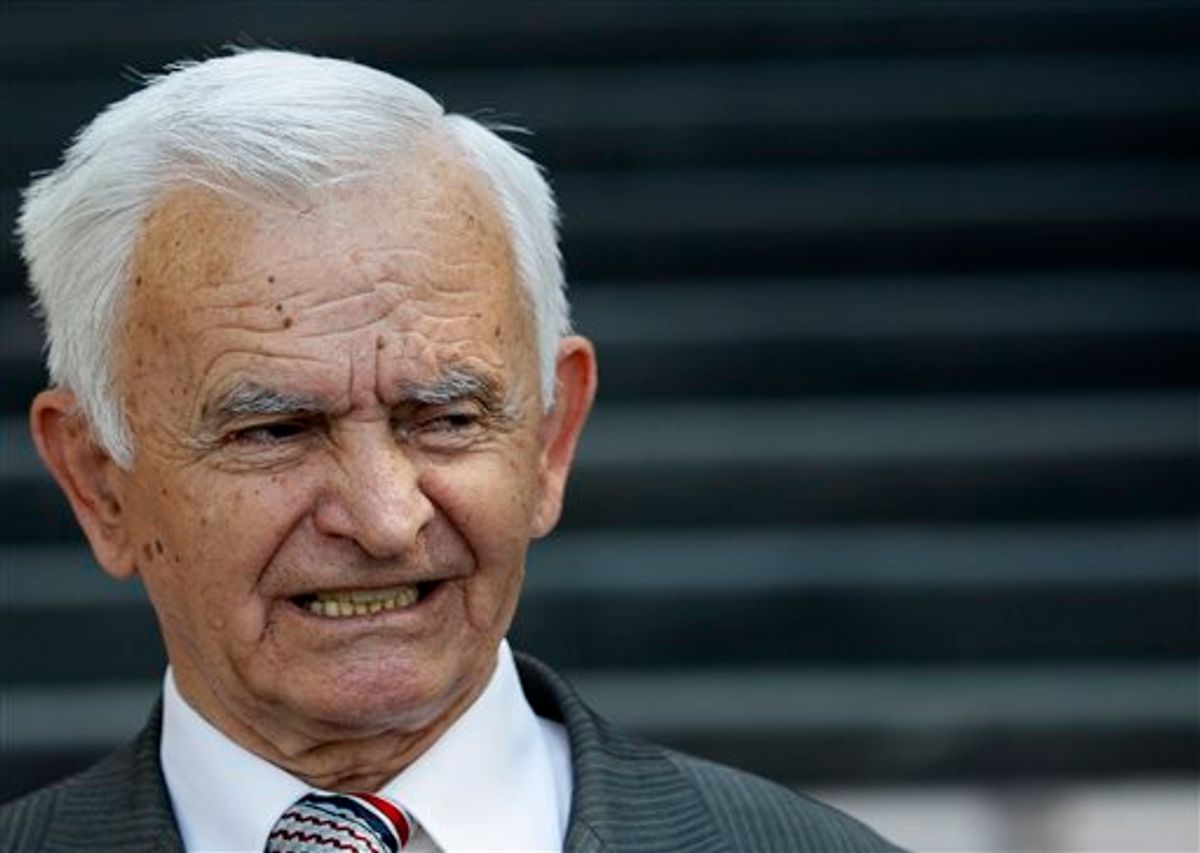Judges have rejected an appeal by war crimes suspect Ratko Mladic seeking to stop his extradition to a U.N. tribunal, Serbia's chief war crimes prosecutor said Tuesday, paving the way for his quick hand-over to face charges for the worst atrocities in Europe since World War II.
The former Bosnian Serb commander will be extradited to The Hague, Netherlands "as soon as possible," Vladimir Vukcevic told The Associated Press. The Belgrade court made the decision just hours after it said it received the appeal in the mail arguing the 69-year-old is not mentally and physically fit to stand trial.
Serbian Justice Minister Snezana Malovic has scheduled a press conference for 5 p.m. (1500 GMT; 11 a.m. EDT) Tuesday at which she is expected to announce she signed the extradition order.
Asked if this means that the transfer will happen on Tuesday, Vukcevic said "not necessarily."
"It will depend on the evaluation on how this should be done so as not to disturb the public," he said, adding no one will be informed when Mladic will be transported from prison and flown to the Netherlands because of security risks.
Mladic is charged at the tribunal for atrocities committed by his Serb troops during Bosnia's 1992-5 war, including the notorious Srebrenica massacre that left 8,000 Muslim men and boys dead -- the worst atrocity against civilians in Europe since World War II.
Mladic was arrested Thursday in a village north of Belgrade after 16 years on the run, looking worn and disheveled. In addition to the appeal, Mladic attorney Milos Saljic had asked for a team of doctors to examine Mladic, who is said to have suffered at least two strokes.
Prosecutors accused Mladic of using delaying tactics and said nothing should prevent his extradition to the tribunal, maintaining that doctors who have examined him say Mladic is in good enough health to face trial.
Earlier Tuesday, the ex-general was briefly released from his jail cell, traveling in a secret high-security armored convoy to a suburban cemetery where he visited the grave of the daughter who killed herself in 1994 during the war, reportedly because she was depressed over his brutal role in the war.
At the black marble grave, he left a lit candle and a small white bouquet of flowers with a red rose in the middle, in what prosecutors called an emotional visit.
"We didn't announce his visit to the grave because it is his private thing and because it represented a security risk," deputy war crimes prosecutor Bruno Vekaric said. "The whole operation lasted for exactly 22 minutes and passed without a glitch. He was at the grave for a few minutes."
Mladic had repeatedly demanded that he be allowed to visit the grave, a memorial he had avoided for years as he tried to avoid capture.
"We had cameras there and 24-hour surveillance, so he could absolutely not show up there," Vukcevic told the AP. "I've been told that he reacted emotionally."
Mladic's 23-year-old daughter Ana, a medical student, committed suicide in 1994 with her father's pistol. She reportedly never wrote a suicide note, but media at the time said she ended her life at Mladic's Belgrade family house because of depression caused by her father's role in the war.
Mladic has rejected the official investigation into his case and claimed she was killed by his wartime enemies, saying the pistol was found in her left hand, although she was right-handed.
Kadira Gabeljic, whose husband and two sons were killed in the Srebrenica slaughter, reacted with disbelief and anger at Mladic's visit to his daughter's grave, saying she almost fainted at the news.
So far, she said, forensic experts have managed to exhume only part of the remains of her sons, Mesud and Meho, who were 16 and 21 when killed.
"He was allowed to do it, and I am still searching for my children for the past 16 years, ever since Srebrenica happened," she said.
"My husband had been found, but what about my children?," she asked. "I will wait for years. I might even die before their complete remains are found."
Serb nationalists in Serbia and parts of Bosnia still consider Mladic a hero -- the general who against all odds tried to defend ethnic Serbs in the Bosnian conflict. In the Bosnian city of Banja Luka, thousands of supporters protested his arrest Tuesday, in the biggest demonstration so far in the country.
Demonstrators chanted Mladic's name, and carried his picture alongside those of Russian Prime Minister Vladimir Putin and President Dmitry Medvedev, whom they consider their biggest allies.
On Monday, Serbian President Boris Tadic rejected speculation that authorities had known of Mladic's hiding place and delayed his arrest to coincide with a visit by EU foreign policy chief Catherine Ashton. The rumors have persisted because Mladic was found living not far from the capital, Belgrade, with relatives who share his last name.
The president said it's time for the European Union to do its part by boosting his nation's efforts to join the bloc, arguing the arrest of Mladic proves it is serious about rejoining the international fold.
------
Sabina Niksic contributed to this report.



Shares